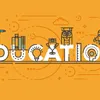Creating skills of tomorrow by disrupting today’s education system
It is about time that India’s education system rid itself of rote-based learning and adopted a contemporary curriculum that is more experiential with emphasis on technology and skillset development.
Disruption is a sudden break or interruption. Disruptive education is, therefore, the one which intends to transform with the established model to improve the existing one. And many experts think the change is both necessary and urgent because the current education system is anachronistic, and needs to be replaced by a solid base imbibing the skills in students to make them future ready.
The National Education Policy 2020 is welcoming change in the education ecosystem, but will we succeed in the implementation of these new changes? While we are here, the educators must ensure to integrate the following points to the education system to nurture the leaders of tomorrow.
Here are a few ways to disrupt the education system to prepare our students for the future:
Experiential learning
Today it is crucial to give up on rote learning and adapt experiential learning. The students will have to understand the practical side of the learned concepts and should be ready to implement them in the real world.
Experience-based learning is productive because it can establish lasting behaviour change. Under this type of learning, students develop new habits and behaviours, rather than simply understanding a new subject or gaining a skill.
The education process must follow the experiential learning cycle -- experience, reflect, conceptualise, experiment.
The introduction of entrepreneurship at the school level allows students to experience the said cycle organically.
Technological integration
It is a technologically dominated world and it is going to be so for the foreseeable future. So, it is essential to familiarise students with technology right from a young age. Be it coding or the culture of BYOD (Bring Your Own Device), this shift toward technology is vital.
Courses on entrepreneurship at an early stage encourages students to integrate technology to stay at the top of their game. Being tech-savvy is no more an option, it is a necessity for a successful future.
Industry standards
The gap between the knowledge acquired through traditional education and the industrial standards is still very substantial. That is the reason we have more engineers languishing at home instead of being productive at companies. But it is time to change it and the only way to do so is to modify the way we teach our children. It is important to familiarise students with industrial standards.
How can we do that?
Provide internships, interaction with the industry experts, and constant assessment of the skillsets prompts us to our next point.
ALSO READ

Skillset development
Every single student must be equipped with 21st-century skillsets -- critical thinking, creativity, collaboration, problem-solving, etc. These skills are as important (if not more) as holding a degree.
It is important to constantly work on students’ skillset development. This can be done in various ways -- provide opportunities to exercise critical thinking, let them take part in entrepreneurial programs, encourage them to take up competitive exams that assess skills, sports, theatre and much more.
A lot could be and should be done towards skillset development and this has to come from the educators for the benefit of students.
Better educators
“There are no bad students, only bad teachers” is true.
For quality education, we need quality teachers. All the educational institutions must pay special attention to teacher training so teachers keep elevating the standard of education. It will align the students and teachers on a similar pace.
Overhauled curriculum
Students are learning the same concepts that are being taught for generations now. Our curriculum is going obsolete and it is important to cater to an expertly curated curriculum for the students.
A fertile environment for growth
Last but not least, the education system needs to keep evolving with the changing times. This evolution must happen not only in the area of curriculum updates but also in the areas of skills development, attitude building, values and ethics, etc.
There is a long way to go to achieve this description, but the change should happen sooner than later.
(Disclaimer: The views and opinions expressed in this article are those of the author and do not necessarily reflect the views of YourStory.)








